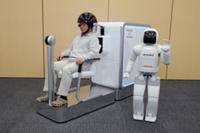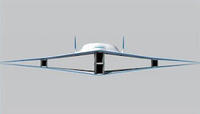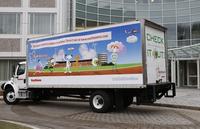-
New method for cleaning up nuclear waste
There are more than 436 nuclear power plants operating in thirty countries, and they create a lot of nuclear waste; one of the more toxic elements in that waste is radionuclide technetium (99Tc); approximately 305 metric tons of 99Tc were generated from nuclear reactors and weapons testing from 1943 through 2010
-
-
Simulation of nuclear fusion shows high-gain energy output
High-gain nuclear fusion could be achieved in a preheated cylindrical container immersed in strong magnetic fields, according to a series of computer simulations performed at Sandia National Laboratories; the method appears to be fifty times more efficient than using X-rays — a previous favorite at Sandia — to drive implosions of targeted materials to create fusion conditions
-
-
Asteroid to miss Earth next year, but not by much

When it whizzes past Earth in 2013, a newly discovered asteroid is going to miss our planet — but not by much; the 50-meter space rock is expected to come closer than many satellites, highlighting the growing need to keep watch on hazards from above
-
-
Good news: metal-reducing bacteria interacts with plutonium oxide
Studies show that under oxygen-free conditions, plutonium(IV) hydrous oxide, the most common subsurface form of plutonium, does not become very soluble; this information will help in developing effective approaches for isolating and removing the contaminants before they can impact humans and the environment
-
-
Breakthrough in next gen nuclear detectors

Researchers have long struggled to develop radiation detectors that can spot a nuclear device hidden away in a shielded case, but a recent breakthrough could change all that
-
-
Pentagon explores mind-controlled battle robots

Taking a page from the popular movie Avatar, the military’s advanced research arm DARPA is seeking to develop technology that would allow troops to remotely inhabit the bodies of mechanical androids on the battlefield
-
-
Smart grid: from deployment to applications
Some 200 million smart meters have been deployed worldwide, forty million of them in North America; a new white paper from Pike Research says that the year 2012 represents a turning point for the sector
-
-
Using people with cell phones as surveillance nodes
Eighty-eight percent of Americans now own a cell phone, forming a massive network that offers scientists a wealth of information and an infinite number of new applications; with the help of these phone users — and their devices’ cameras, audio recorders, and other features — researchers envision endless possibilities for gathering huge amounts of data
-
-
Bi-plane to revive supersonic travel

Researchers say that the best way to revive supersonic air travel – which came to an end with the retirement of the Concorde in 2003 – would be by building a plane with two wings to a side; computer models show that a bi-plan produces significantly less drag than a conventional single-wing aircraft at supersonic cruise speeds
-
-
Scientists develop a dirty bomb detection system
As part of a £3 million international project funded by the European Commission, scientists at the University of Liverpool are developing a mobile detection system for nuclear materials that could prevent the construction of atomic weapons and dirty bombs
-
-
Raytheon expands Pi Day annual celebration --

Pi, the mathematical constant approximately equal to 3.14, is significance in science, technology, engineering, and math (STEM) innovation; Raytheon expanded its annual Pi Day tradition, celebrated nationwide 14 March because of the date’s numerical significance; company employees delivered hundreds of apple pies nationwide to math and science teachers at middle and high schools located within a 3.14-mile radius of select Raytheon business locations across the country
-
-
Researchers developing wireless emergency network for disasters
University of Arkansas researchers are developing a solar powered wireless emergency communications network that can be deployed during major disasters to transmit critical warnings and geographic information
-
-
Killer silk kills anthrax, other microbes dead
A simple, inexpensive dip-and-dry treatment can convert ordinary silk into a fabric that kills disease-causing bacteria — even the armor-coated spores of microbes like anthrax — in minutes
-
-
Iron is key to reversing climate change
Scientists and politicians are trying to devise ways to reduce CO2 emissions — but when it comes to getting rid of the CO2 that is already there, nature itself plays an important role: carbon dioxide is removed from the atmosphere and safely trapped on the ocean floor through a natural reaction that fixes the molecule to organic carbon on the surface of large bodies of water
-
-
Harvesting energy, water from human waste
Researchers begin developing prototype device for harvesting energy and clean drinking water from human waste; the device proposal beat more than 2,000 other proposals to receive funding from the Bill and Melinda Gates Foundation
-
More headlines
The long view
New Technology is Keeping the Skies Safe
DHS S&T Baggage, Cargo, and People Screening (BCP) Program develops state-of-the-art screening solutions to help secure airspace, communities, and borders
Factories First: Winning the Drone War Before It Starts
Wars are won by factories before they are won on the battlefield,Martin C. Feldmann writes, noting that the United States lacks the manufacturing depth for the coming drone age. Rectifying this situation “will take far more than procurement tweaks,” Feldmann writes. “It demands a national-level, wartime-scale industrial mobilization.”
How Artificial General Intelligence Could Affect the Rise and Fall of Nations
Visions for potential AGI futures: A new report from RAND aims to stimulate thinking among policymakers about possible impacts of the development of artificial general intelligence (AGI) on geopolitics and the world order.
Smaller Nuclear Reactors Spark Renewed Interest in a Once-Shunned Energy Source
In the past two years, half the states have taken action to promote nuclear power, from creating nuclear task forces to integrating nuclear into long-term energy plans.
Keeping the Lights on with Nuclear Waste: Radiochemistry Transforms Nuclear Waste into Strategic Materials
How UNLV radiochemistry is pioneering the future of energy in the Southwest by salvaging strategic materials from nuclear dumps –and making it safe.
Model Predicts Long-Term Effects of Nuclear Waste on Underground Disposal Systems
The simulations matched results from an underground lab experiment in Switzerland, suggesting modeling could be used to validate the safety of nuclear disposal sites.
